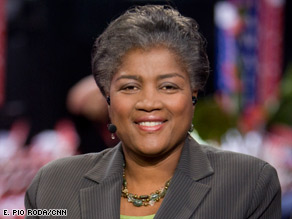commentary:Lincoln lived-and died for freedom
- Story Highlights
- Donna Brazile: President Obama returns to Illinois to honor Lincoln's 200th birthday
- Brazile says Lincoln was committed to preserve freedom as guiding principle
- She says Lincoln said he'd rather die than surrender freedom
- Brazile: Lincoln insisted on opening White House doors to the public
- Next Article in Politics »
CNN Contributor
Editor's note: Donna Brazile, a Democratic strategist, is vice chair for voter registration and participation at the Democratic National Committee and founder of Brazile & Associates, a political consulting firm. She was the campaign manager for the Al Gore-Joe Lieberman ticket in 2000 and wrote "Cooking With Grease."

Donna Brazile says Abraham Lincoln fought to preserve the union on the foundation of freedom.
WASHINGTON (CNN) -- President Obama is taking a trip back home to Illinois on Thursday to pay tribute to the nation's 16th president, Abraham Lincoln, on the 200th anniversary of his birth.
Lincoln's personal principles, his political sagacity and his character are all worthy of emulation by anyone interested in public service.
Like Obama, I have always been a great fan of Lincoln, whose role in our history isn't based only on his signing of the Emancipation Proclamation (for which he justly deserves credit) but, in large measure, for preserving a nation based on "liberty for all."
En route to his inauguration in 1861, Lincoln stopped in Philadelphia, Pennsylvania, to deliver a speech at Independence Hall, where the Declaration of Independence had been signed and where his body would lie in state four years later.
That night he said, "I have often inquired of myself, what great principle or idea it was that kept this [nation] so long together. It was not the mere matter of the separation of the Colonies from the motherland; but that sentiment in the Declaration of Independence which gave liberty, not alone to the people of this country, but, I hope, to the world, for all future time." Watch iReporters recite Lincoln's second inaugural address
Though Lincoln began the abolition of slavery, today we must also remember him as the president who assured the survival of the Declaration of Independence, preserving and enshrining it as the centerpiece of our national soul.
Don't Miss
Inside Independence Hall that night, he told the good people of Philadelphia, "I have never had a feeling politically that did not spring from the sentiments embodied in the Declaration of Independence."
People should read this speech carefully. It's only 465 words, but each one of them is important. Every one of its 21 sentences speaks to Lincoln's deep commitment to saving the United States as a nation formed to lift the "weight [of inequality] from the shoulders of all men."
Some say Lincoln didn't really care about abolishing slavery. They trot out his assertion that he'd do what he had to do to preserve the Union -- be it free for all, some, or none of the slaves. But here's the kicker: Keeping the nation intact on its philosophical belief that "all men are created equal" was the only way to assure the eventual demise of slavery. This was Lincoln's plan, to preserve the nation on that foundational footing.
Outside the Union, there was no hope slavery would end. This was especially so in a Confederacy whose vice president, Alexander Stephens, asserted in his inaugural acceptance speech that "our new government" is based "on exactly the opposite idea."
Lincoln countered, "That sentiment in the Declaration of Independence which gave liberty, not alone to the people of this country, but, I hope, to the world, for all future time," adding four sentences later, "If it cannot be saved upon that principle, it will be truly awful. But if this country cannot be saved without giving up that principle, I was about to say I would rather be assassinated on this spot than surrender it."
So on this day, the 200th anniversary of Lincoln's birth, let us remember that this president, perhaps the greatest our country has ever known, gave his life, as he said he would, to preserve the union and its declared principle of freedom for all. iReport.com: Send your version of the second inaugural address
Lincoln belongs to all of us, the people he so dearly loved. Once a month, he would throw open the doors to the White House and welcome any man, woman or child who wanted to visit with him. And they lined up to see him. First come was first served.
Lincoln's aides, of course, tried to persuade him to stop his monthly open-door policy. But he told them that those interviews were his "public opinion bath" and that he would be lost without them.
Perhaps this is why so many politicians lose touch with their constituents. They don't take hang out with regular folks. They don't spend time listening to the concerns of everyday working stiffs. Lincoln's example is one they should all try to emulate.
If Lincoln were alive today, what advice would he whisper in the ear of our nation's 44th president that would help preserve the union, unify its people and help citizens struggling with debt, foreclosures and joblessness? Given Obama's often-stated love and respect for his fellow statesman from Illinois, he no doubt asks himself the same question every day.
Obama is right to pay tribute to this great man on this special day. Let's hope and pray that the former senator from Illinois can live up to Lincoln's example and keep our union intact during these difficult times.
The opinions expressed in this commentary are solely those of Donna Brazile.

Comments